BusinessEurope Headlines No. 2017-09
Tripartite Social Summit
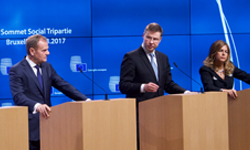 At the Tripartite Social Summit, BusinessEurope President Emma Marcegaglia said: “Europeans are faced with unprecedented challenges: in the international environment, in upcoming Brexit negotiations, regarding employment, security, migration, etc. Member states acting alone will not be able to respond effectively to these challenges. They must stay united.” She added: “The European Commission should also not lose sight of the fact that the EU is a good place to live and work. The EU is the region in the world where social well-being is the highest.” The Tripartite Social Summit is a bi-annual meeting under the joint leadership of the European social partners, the European Commission and the European Council right before the European Council meetings in March and October. This meeting focused on "The future of Europe: charting the course towards growth, employment and fairness".
At the Tripartite Social Summit, BusinessEurope President Emma Marcegaglia said: “Europeans are faced with unprecedented challenges: in the international environment, in upcoming Brexit negotiations, regarding employment, security, migration, etc. Member states acting alone will not be able to respond effectively to these challenges. They must stay united.” She added: “The European Commission should also not lose sight of the fact that the EU is a good place to live and work. The EU is the region in the world where social well-being is the highest.” The Tripartite Social Summit is a bi-annual meeting under the joint leadership of the European social partners, the European Commission and the European Council right before the European Council meetings in March and October. This meeting focused on "The future of Europe: charting the course towards growth, employment and fairness".
Photo copyright: European Union 2017
![]()
![]() Contact: Daniele Olivieri
Contact: Daniele Olivieri
Framework agreement on active ageing: signing ceremony
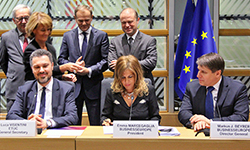 After nine months of negotiations, EU employers and trade unions approved a framework agreement on active ageing and an intergenerational approach. The agreement is to ensure a healthy, safe and productive working environment and work organisation to enable workers of all ages to remain in work until legal retirement age. It is to facilitate the transfer of knowledge and experience between generations at the workplace and takes into account the changing national demographic and labour market realities. BusinessEurope, UEAPME, CEEP and the ETUC signed and handed over the agreement to European Commission President Juncker, European Council President Tusk and the Maltese Prime Minister Muscat on Wednesday 8 March during a signature ceremony. This agreement will be implemented by the members of the signatory organisations across Europe. When signing this agreement on behalf of BusinessEurope, President Emma Marcegaglia said: “This agreement is a positive outcome demonstrating the added value of the European social dialogue to find adaptable solutions to important EU challenges taking into account diverse national labour markets contexts. It will make an important contribution to face demographic challenges and help achieve longer working lives across Europe”.
After nine months of negotiations, EU employers and trade unions approved a framework agreement on active ageing and an intergenerational approach. The agreement is to ensure a healthy, safe and productive working environment and work organisation to enable workers of all ages to remain in work until legal retirement age. It is to facilitate the transfer of knowledge and experience between generations at the workplace and takes into account the changing national demographic and labour market realities. BusinessEurope, UEAPME, CEEP and the ETUC signed and handed over the agreement to European Commission President Juncker, European Council President Tusk and the Maltese Prime Minister Muscat on Wednesday 8 March during a signature ceremony. This agreement will be implemented by the members of the signatory organisations across Europe. When signing this agreement on behalf of BusinessEurope, President Emma Marcegaglia said: “This agreement is a positive outcome demonstrating the added value of the European social dialogue to find adaptable solutions to important EU challenges taking into account diverse national labour markets contexts. It will make an important contribution to face demographic challenges and help achieve longer working lives across Europe”.
![]() Contact: Daniele Olivieri
Contact: Daniele Olivieri
A strong Europe based on a strong economy
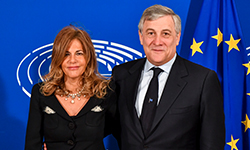
Industrial policy, trade and investment are key for growth, competitiveness and job creation in Europe and to take the European project forward. This is what BusinessEurope President Emma Marcegaglia and Director General Markus J. Beyrer discussed with the European Parliament President, Antonio Tajani, on 8 March 2017. Presidents Tajani and Marcegaglia and Director General Beyrer agreed on the imperative need for a European industrial policy to attract more investment in Europe. The European industrial policy should mobilise different tools at national and European level: completion of the single market, economic governance, structural reforms, trade policy, etc. Free trade based on respect of rules and fair competition is key. Trade is the engine of prosperity for the European companies and citizens, and the EU should remain open to partners willing to share its values and vision about open global trade. President Tajani and President Marcegaglia both underlined that, now more than ever, for the 60th anniversary celebrations of the Treaty of Rome, European unity is needed.
Photo copyright: European Union 2017 / EP
Contact: Daniele Olivieri
Reform Barometer event highlights lack of reform implementation
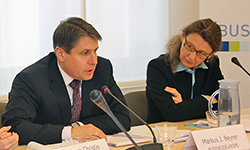 “Rather than using the supportive growth environment to press ahead with long-term economic reforms, the Reform Barometer highlights that many Member States are taking their foot off the reform throttle. But rapid changes in the global economy, combined with Europe’s competitiveness and public finance challenges, mean reform remains a matter of urgency”, Director General Markus J. Beyrer said at BusinessEurope’s Reform Barometer 2017 launch event, on 2 March 2017. Other speakers at the event included: MEP Maria João Rodrigues; Cologne Institute for Economic Research’s Michael Hüther, Emmanuelle Maincent from the European Commission and IBEC’s Fergal O’Brien.
“Rather than using the supportive growth environment to press ahead with long-term economic reforms, the Reform Barometer highlights that many Member States are taking their foot off the reform throttle. But rapid changes in the global economy, combined with Europe’s competitiveness and public finance challenges, mean reform remains a matter of urgency”, Director General Markus J. Beyrer said at BusinessEurope’s Reform Barometer 2017 launch event, on 2 March 2017. Other speakers at the event included: MEP Maria João Rodrigues; Cologne Institute for Economic Research’s Michael Hüther, Emmanuelle Maincent from the European Commission and IBEC’s Fergal O’Brien.
![]() Contact: Frederik Lange
Contact: Frederik Lange
Markus J. Beyrer meets Alexander Graf Lambsdorff
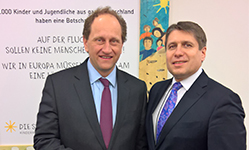 Director General Markus J. Beyrer met Alexander Graf Lambsdorff, the vice-president of the European Parliament, to discuss the main subjects on the EU’s agenda. These include the White Paper on the future of Europe, the Rome summit, Brexit, trade, and the economy. Markus explained that a strong Europe and a strong, reformed and competitive economy go hand in hand and are a prerequisite for regaining the citizen’s trust.
Director General Markus J. Beyrer met Alexander Graf Lambsdorff, the vice-president of the European Parliament, to discuss the main subjects on the EU’s agenda. These include the White Paper on the future of Europe, the Rome summit, Brexit, trade, and the economy. Markus explained that a strong Europe and a strong, reformed and competitive economy go hand in hand and are a prerequisite for regaining the citizen’s trust.
Contact: Christian Feustel
EU-Latin America: building stronger business ties
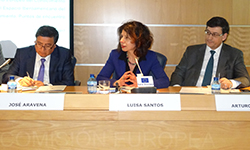 BusinessEurope participated in the X Seminar EU-Latin America, organised by Fundación Euroamérica on 2 March in Madrid. This year, participants discussed knowledge transfer and increased cooperation between the two regions. Speaking on a panel with European and Latin American companies, BusinessEurope’s Director of International Relations Luisa Santos said: “Cooperation among companies is key to consolidate competitiveness in both regions. By working together, we are promoting the transfer of knowledge strengthening business in both regions”. Relations between the EU and Latin America are already strong, but now we have the opportunity to expand them by concluding important trade agreements or modernising existing ones. The EU-MERCOSUR trade agreement or the modernisation of the EU-Mexico deal, both currently being negotiated, are good examples. “At a time when others seem to be disengaging, the EU must set the example by establishing closer trade and investment relations with Latin American countries”, Luisa Santos added.
BusinessEurope participated in the X Seminar EU-Latin America, organised by Fundación Euroamérica on 2 March in Madrid. This year, participants discussed knowledge transfer and increased cooperation between the two regions. Speaking on a panel with European and Latin American companies, BusinessEurope’s Director of International Relations Luisa Santos said: “Cooperation among companies is key to consolidate competitiveness in both regions. By working together, we are promoting the transfer of knowledge strengthening business in both regions”. Relations between the EU and Latin America are already strong, but now we have the opportunity to expand them by concluding important trade agreements or modernising existing ones. The EU-MERCOSUR trade agreement or the modernisation of the EU-Mexico deal, both currently being negotiated, are good examples. “At a time when others seem to be disengaging, the EU must set the example by establishing closer trade and investment relations with Latin American countries”, Luisa Santos added.
Contact: Julia Navarro
Healthy and productive workplaces: Supporting employers and workers to implement existing legislation
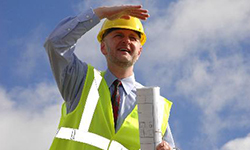 Speaking at a lunch debate on 3 March with Employment and Social Affairs Ministers, Maxime Cerutti, BusinessEurope Director for Social Affairs, recalled that Europe is characterised by high standards of health and safety at work and that the EU legal framework in this area is already comprehensive. Commenting on the European Commission’s recently published communication on health and safety at work, he highlighted that the overall approach is balanced, in particular the focus on implementing existing legislation, providing guidance and support to employers and workers, and promoting a culture of compliance and prevention at the workplace. “We agree that the overall framework and structure remains appropriate and is generally effective in protecting workers. Therefore, there should not be unnecessary changes to EU legislation in this field, including as part of the announced programme to remove or update outdated provisions. Any follow-up action must be restricted to genuine better regulation objectives.”
Speaking at a lunch debate on 3 March with Employment and Social Affairs Ministers, Maxime Cerutti, BusinessEurope Director for Social Affairs, recalled that Europe is characterised by high standards of health and safety at work and that the EU legal framework in this area is already comprehensive. Commenting on the European Commission’s recently published communication on health and safety at work, he highlighted that the overall approach is balanced, in particular the focus on implementing existing legislation, providing guidance and support to employers and workers, and promoting a culture of compliance and prevention at the workplace. “We agree that the overall framework and structure remains appropriate and is generally effective in protecting workers. Therefore, there should not be unnecessary changes to EU legislation in this field, including as part of the announced programme to remove or update outdated provisions. Any follow-up action must be restricted to genuine better regulation objectives.”
Contact: Rebekah Smith
EU export controls regime – Finding the right balance between trade and security
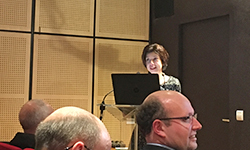 “It is important that the modernisation of the EU export controls regime strikes the right balance between trade and security policy objectives”, International Relations Director Luisa Santos stated at the event on export controls on dual-use items organised on 6 March 2017 in Paris by the Electronic and Strategic Products Industries of France. Dual-use are items that can be used both for civilian and military purposes. They are often high-tech products, representing sectors such as IT, chemicals and infrastructure. Therefore, ensuring a competitive environment for the exports of those items should be a strategic objective for the EU. BusinessEurope is positive about the on-going efforts to improve the administration of the regime, such as on reducing the time required to obtain a licence to export a dual-use item or enhancing cooperation among the Member States’ competent authorities. At the same time, we would like to further discuss the overarching concept of human security and see how it is implemented in practice through the EU regulation. Businesses need certainty and predictability. The development of guidelines will contribute to achieving this objective but it is important that businesses are involved in the process. BusinessEurope follows the currently on-going legislative process and remains engaged to contribute to a constructive and balanced solution.
“It is important that the modernisation of the EU export controls regime strikes the right balance between trade and security policy objectives”, International Relations Director Luisa Santos stated at the event on export controls on dual-use items organised on 6 March 2017 in Paris by the Electronic and Strategic Products Industries of France. Dual-use are items that can be used both for civilian and military purposes. They are often high-tech products, representing sectors such as IT, chemicals and infrastructure. Therefore, ensuring a competitive environment for the exports of those items should be a strategic objective for the EU. BusinessEurope is positive about the on-going efforts to improve the administration of the regime, such as on reducing the time required to obtain a licence to export a dual-use item or enhancing cooperation among the Member States’ competent authorities. At the same time, we would like to further discuss the overarching concept of human security and see how it is implemented in practice through the EU regulation. Businesses need certainty and predictability. The development of guidelines will contribute to achieving this objective but it is important that businesses are involved in the process. BusinessEurope follows the currently on-going legislative process and remains engaged to contribute to a constructive and balanced solution.
Contact: Sofia Bournou
Structural reforms and the EU-Ukraine deep and comprehensive free-trade area
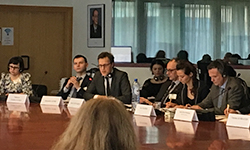 In the context of the EU-Ukraine High-level Industrial and Regulatory Dialogue that took place in Brussels on 1-2 March 2017, BusinessEurope Industrial Affairs Director Alexandre Affre stressed the importance of a continued collaboration between regulators and the business community. This will allow EU and Ukrainian standards to converge and the development of a transparent and business-friendly environment in Ukraine. The adoption of good governance practices and the strengthening of the private sector’s participation in the decision-making processes are important factors to improve the competitiveness of the Ukrainian economy and help attract investment. The structures provided under the Association Agreement and the Deep and Comprehensive Free Trade Area can become dynamic platforms that will help the EU and Ukraine take full advantage of economic and trade opportunities.
In the context of the EU-Ukraine High-level Industrial and Regulatory Dialogue that took place in Brussels on 1-2 March 2017, BusinessEurope Industrial Affairs Director Alexandre Affre stressed the importance of a continued collaboration between regulators and the business community. This will allow EU and Ukrainian standards to converge and the development of a transparent and business-friendly environment in Ukraine. The adoption of good governance practices and the strengthening of the private sector’s participation in the decision-making processes are important factors to improve the competitiveness of the Ukrainian economy and help attract investment. The structures provided under the Association Agreement and the Deep and Comprehensive Free Trade Area can become dynamic platforms that will help the EU and Ukraine take full advantage of economic and trade opportunities.
Contact: Sofia Bournou
Robotisation, artificial intelligence and the future of work
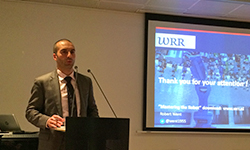 Artificial intelligence (AI) technologies and robotics can have many applications in the real world and considerably contribute to productivity and society. But there are also concerns that they will pose a threat to people’s jobs, as these applications can substitute humans in an increasing number of tasks. Advances do not come without challenges. Some improvements in efficiency and productivity may result in loss of jobs. Depending on various factors, re-skilling opportunities may be limited. But even if some jobs will disappear, many others will be created. Speaking at the event on “The implications of robotisation on the future of work” organised by the Dutch Permanent Representation on 8 March, Deputy Director Guido Lobrano underlined the need to maintain an objective and balanced approach and stressed both opportunities and challenges: “Europe needs to seize the opportunities of digitalisation, but for that to happen, we need the right conditions for innovation, accompanying change and avoiding focusing primarily on possible risks.”
Artificial intelligence (AI) technologies and robotics can have many applications in the real world and considerably contribute to productivity and society. But there are also concerns that they will pose a threat to people’s jobs, as these applications can substitute humans in an increasing number of tasks. Advances do not come without challenges. Some improvements in efficiency and productivity may result in loss of jobs. Depending on various factors, re-skilling opportunities may be limited. But even if some jobs will disappear, many others will be created. Speaking at the event on “The implications of robotisation on the future of work” organised by the Dutch Permanent Representation on 8 March, Deputy Director Guido Lobrano underlined the need to maintain an objective and balanced approach and stressed both opportunities and challenges: “Europe needs to seize the opportunities of digitalisation, but for that to happen, we need the right conditions for innovation, accompanying change and avoiding focusing primarily on possible risks.”
Contact: Guido Lobrano
Calendar
- 9-10 March 2017: European Council
- 15 March 2017: Elections in the Netherlands
- 20 March 2017: Eurogroup
- 21 March 2017: Economic and Financial Affairs Council